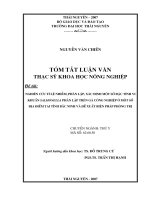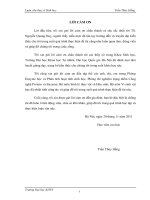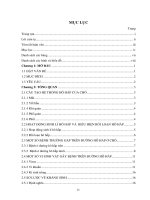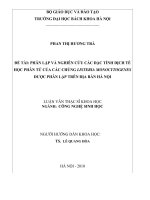Phân lập và nghiên cứu đặc điểm sinh học của chủng nấm Sclerotium rolfsii gây bệnh thối gốc lạc
Bạn đang xem bản rút gọn của tài liệu. Xem và tải ngay bản đầy đủ của tài liệu tại đây (16.91 MB, 13 trang )
Vietnam J. Agri. Sci. 2022, Vol. 20, No. 12: 1659-1671
Tạp chí Khoa học Nơng nghiệp Việt Nam 2022, 20(12): 1659-1671
www.vnua.edu.vn
Nguyễn Xuân Trường1, Trần Thị Đào2, Tạ Hà Trang2,
Nguyễn Thanh Huyền2, Ngô Thị Vân Anh2, Nguyễn Xuân Cảnh2*
1
Viện Sinh học Nông nghiệp, Học viện Nông nghiệp Việt Nam
2
Khoa Công nghệ sinh học, Học viện Nông nghiệp Việt Nam
*
Tác giả liên hệ:
Ngày nhận bài: 04.08.2022
Ngày chấp nhận đăng: 20.12.2022
TÓM TẮT
Sản xuất lạc đang gặp nhiều khó khăn do tỉ lệ cây bị bệnh thối gốc, gây ra bởi nấm Sclerotium rolfsii ngày càng
tăng nhưng vẫn chưa có giải pháp hiệu quả để xử lý. Nghiên cứu được thực hiện nhằm xác định đặc điểm sinh học
của nấm S. rolfsii, từ đó định hướng biện pháp phòng và điều trị bệnh thối gốc trên cây lạc hiệu quả hơn. Từ 10 mẫu
bệnh thu thập tại tỉnh Nam Định và Thái Bình, bằng phương pháp nuôi cấy trên môi trường PDA kết hợp tái lây
nhiễm trên cây lạc, 6 chủng nấm bệnh đã được phân lập, trong đó chủng LT1 và LN1 thể hiện khả năng gây bệnh
mạnh nhất. Hai chủng này đã định danh phân tử là chủng S. rolfsii isolate LT1 và chủng S. rolfsii strain LN1. Chúng
thuộc cùng nhóm tương thích hệ sợi. Cả hai chủng đều có khả năng sinh trưởng tốt trên môi trường PDA khi nuôi ở
30C, pH từ 5,0 đến 6,0 với đường kính tản nấm đạt tối đa (> 90mm) sau 3 ngày nuôi; hệ sợi nấm màu trắng, đâm
tia mạnh. Hạch nấm được hình thành sau 4-5 ngày ni và hóa nâu sau 6-7 ngày nuôi với 921 hạch (LT1) và 420
hạch (LN1). Trong quá trình sinh trưởng, cả hai chủng đều sinh axit làm giảm mạnh pH môi trường nuôi cấy và sinh
ra enzyme ngoại bào.
Từ khóa: Bệnh thối gốc, cây lạc, Sclerotium rolfsii.
Isolation and Characterization
of Sclerotium rolfsii Strains Causing Stem Rot Disease in Peanut
ABSTRACT
Peanut production has been facing many difficulties due to the increasing incidence of Sclerotinia stem rot
disease caused by Sclerotium rolfsii but there is still no effective solution to deal with this disease. Therefore, this
study was conducted to determine the biological characteristics of S. rolfsii, thereby orienting measures to control the
disease more effectively. From 10 peanut samples showing stem rot symptoms collected from Thai Binh and Nam
Dinh provinces, by inoculating method on PDA medium combined with artificial infection method on peanut plant, 6
fungal strains were determined capable of causing disease, in which LT1 and LN1 expressed the strongest
pathogenicity. They were identified as S. rolfsii isolate LT1 and S. rolfsii strain LN1, respectively. Two isolates were in
o
the same mycelial compatibility group. Specifically, they grew and formed sclerotia well in PDA medium at 30 C and
pH: 5,0-6,0. Simultaneously, on the PDA medium, the colonies of LT1 and LN1 showed maximum growth (>90 mm)
after 3 days of culture. Their aerial mycelium was white and abundant. Their sclerotia were formed after 4-5 days of
culture and turned brown after 6-7 days with 921 sclerotia (LT1) and 420 sclerotia (LN1). Both of them produced acid
to reduce pH of the culture medium sharply and produced extracellular enzymes.
Keywords: Peanut, Sclerotium rolfsii, stem rot disease.
1659
Phân lập và nghiên cứu đặc điểm sinh học của chủng nấm Sclerotium rolfsii gây bệnh thối gốc lạc
1660
Nguyễn Xuân Trường, Trần Thị Đào, Tạ Hà Trang, Nguyễn Thanh Huyền, Ngơ Thị Vân Anh, Nguyễn Xn Cảnh
×
°
°
°
°
1661
Phân lập và nghiên cứu đặc điểm sinh học của chủng nấm Sclerotium rolfsii gây bệnh thối gốc lạc
°
°
µ
–
(A)
1662
(B)
(C)
Nguyễn Xuân Trường, Trần Thị Đào, Tạ Hà Trang, Nguyễn Thanh Huyền, Ngô Thị Vân Anh, Nguyễn Xuân Cảnh
(A)
(B)
°
1663
Phân lập và nghiên cứu đặc điểm sinh học của chủng nấm Sclerotium rolfsii gây bệnh thối gốc lạc
LT1
A
1664
B
C
D
E
Nguyễn Xuân Trường, Trần Thị Đào, Tạ Hà Trang, Nguyễn Thanh Huyền, Ngô Thị Vân Anh, Nguyễn Xuân Cảnh
Chủng nấm
Môi trường
PDA
CDA
WA
Khả năng
sinh trưởng
LT1
Khả năng
hình thành
hạch nấm
Khả năng
sinh trưởng
LN1
Khả năng
hình thành
hạch nấm
1665
Phân lập và nghiên cứu đặc điểm sinh học của chủng nấm Sclerotium rolfsii gây bệnh thối gốc lạc
Chủng
15°C
20°C
30°C
37°C
45°C
LT1
LN1
1.000
917
900
800
Số hạch/ đĩa
700
600
500
LT1
422,6
400
LN1
300
200
100
0
154
89,3
30
15°C
1666
425
20°C
30°C
26
0
37°C
0
45°C
Nhiệt độ
Nguyễn Xuân Trường, Trần Thị Đào, Tạ Hà Trang, Nguyễn Thanh Huyền, Ngô Thị Vân Anh, Nguyễn Xuân Cảnh
pH: 1,0
pH: 2,0
4 ngày
sau cấy
25 ngày
sau cấy
1667
Phân lập và nghiên cứu đặc điểm sinh học của chủng nấm Sclerotium rolfsii gây bệnh thối gốc lạc
800,0
765,0
700,0
674,0
Số hạch/ đĩa
600,0
500,0
466,6
403,3
400,0
382
450
LT1
368,0
394
330
300,0
411,0
401
LN1
297
200,0
137,3 119,0
65,0
82
61
48
100,0
3
4
5
6
7
8
9
10
11
12
54,6
33
-
13
pH
1668
Nguyễn Xuân Trường, Trần Thị Đào, Tạ Hà Trang, Nguyễn Thanh Huyền, Ngô Thị Vân Anh, Nguyễn Xuân Cảnh
Athelia rolfsii isolate Acsc3
Athelia rolfsii isolate Acsc5
Athelia rolfsii strain zf0112
Athelia rolfsii isolate C13
Athelia rolfsii isolate DQ
Athelia rolfsii isolate NC-1
Athelia rolfsii
Athelia rolfsii strain SR1USVL
Athelia rolfsii strain JN0610
Athelia rolfsii isolate LHBJ2-4
Athelia rolfsii isolate SrC2
LT1
Athelia rolfsii isolate Belavatagi
Athelia rolfsii isolate YKY2020.07
Athelia rolfsii isolate MSB2-1
Athelia rolfsii isolate MSB1-1
1669
Nguyễn Xuân Trường, Trần Thị Đào, Tạ Hà Trang, Nguyễn Thanh Huyền, Ngô Thị Vân Anh, Nguyễn Xuân Cảnh
1670
Aycock R. (1966). Stem rot and other diseases caused
by Sclerotium rolfsii. North Carolina Agricultural
Experiment
Station.
Technical
Bulletin.
pp. 174-202.
Ayed F., Hayfa J.K., Rania A.B.A. & Mejda D.R.
(2018). Effect of temperatures and culture media
on Sclerotium rolfsii mycelial growth, sclerotial
formation and germination. Journal of Plant
Pathology & Microbiology.
Barnett H.L. & Hunter B.B. (1998). Illustrated genera
of imperfect fungi. (4th, eds.). Published by Amer
Phytopathological Society.
Bateman D.F. & Beer S.V. (1965). Simultaneous
production and synergistic action of oxalic acid
and polygalacturonase during pathogenesis by
Sclerotium rolfsii. Physiopathology. 55: 204-211.
Burgess L.W., Knight T.E., Tesoriero L. & Phan Thúy
Hiền (2009). Cẩm nang chẩn đoán bệnh cây ở Việt
Nam. Trung tâm Nghiên cứu Nông nghiệp Quốc
tế Australia.
Chandra Sekhar J., Prakash Mishra J., Prasad R., Reddy
V.P., Kumar S., Thakur A., Sharma R., Joginder
Pal & Teja M.B.S. (2020). Favorable
morphological and cultural conditions for mycelial
growth of Sclerotium rolfsii (curzi) C.C Tu &
Kimber, causing stem blight of tomato.
International Journal of Chemical Studies.
8(3): 1389-1396.
Đỗ Tấn Dũng (2001). Bệnh héo rũ cây trồng cạn và biện
pháp phịng chống. Nhà xuất bản Nơng nghiệp.
Food and Agriculture Organization (FAO) (2017).
Production Statistics of Crops, Food and
Agriculture
Organization.
Retrieved
from
http://faostat. fao.org/ on February 16, 2017.
Nguyễn Xuân Trường, Trần Thị Đào, Tạ Hà Trang, Nguyễn Thanh Huyền, Ngô Thị Vân Anh, Nguyễn Xuân Cảnh
Kasana R.C., Salwan R., Dhar H., Dutt S. & Gulati A.
(2008). A rapid and easy method for the detection
of microbial cellulases on agar plates using gram’s
iodine. Current Microbiology. 57: 503-507.
Kwon J.H & Park C.S. (2002). Stem rot of tomato
caused by Sclerotium rolfsii in Korea.
Microbiology. 30(4): 244-246.
Kohn L.M., Stasoviski E., Carbone I., Royers J. &
Anderson J.B. (1991). Mycelial incompatibility
and molecular markers identify genetic variability
in field populations of Sclerotinia sclerotiorum.
Phytopathology. 81: 480-485.
Le C.N., Mendes R., Kruijt M. & Raaijmakers J.M.
Genetic and phenotypic diversity of Sclerotium
rolfsii Sacc. in groundnut fields in central Vietnam.
Plant Disease. 96(3): 389-397.
Li Y.B., Xiao X.M. & Shen X.F. (2017). Silicon effect
on nutrient acquisition of peanut (Arachis
hypogaea
L.)
under
aluminum
stress.
Communications in Soil Science and Plant
Analysis. 48(21): 2526-33.
Lu W., Shen X. & Chen Y. (2019). Effect of
intercropping peanut on soil nutrient status and
microbial activity within young Camellia oleifera
plantation. Communications in Soil Science and
Plant Analysis. 50: 1-7.
Ludwig R. & Haltrich D. (2002). Cellobiose
dehydrogenase production by Sclerotium species
pathogenic to plants. Letters in Applied
Microbiology. 35: 261-266.
Mehan V.K., Mayee C.D. & McDonald D. (1994).
Management of Sclerotium rolfsii caused stem and
pod rots of groundnut - a critical-review.
International Journal of Pest Management.
40: 313-320.
Mehan V.K., Mayee C.D., Brenneman T.B. &
McDonald D. (1995). Stem and pod rots of
groundnut. Information Bulletin. 44: 28.
Mordue J.E. (1984). Descriptions of pathogenic fungi
and bacteria. Commonwealth Mycological
Institute. 81: 801-810.
Nguyễn Văn Viên & Vũ Triệu Mân (1998). Một số kết
quả nghiên cứu bệnh chết héo cây cà chua do nấm
Sclerotium rolfsii Sacc. Tạp chí Bảo vệ thực vật.
6: 18-21.
Puhalla J.E. (1985). Classification of strains of
Fusarium oxysporum on the basis of vegetative
compatibility. Canadian Journal of Botany.
63: 179-183.
Punja Z.K & Grogan R.G (1983). Hyphal interactions
and antagonism among field isolates and single‐
basidiospore strains of Athelia (Sclerotium) rolfsii.
Phytopathology. 73: 1279-84.
Shokes F.M., Rhogalski K., Gorbet D.W., Brenneman
T.B. & Berger D.A. (1996). Techniques for
inoculation of peanut with Sclerotium rolfsii the
greenhouse and field. Peanut Science. 23: 124-128.
Tendulkar S.R., Gupta A. & Chattoo B.B. (2003). A
simple protocol for isolation of fungal DNA.
Biotechnology Letters. 25: 1941-1944.
Trần Danh Sửu, Nguyễn Thị Chinh, Phạm Thị Xuân &
Trần Thị Ánh Nguyệt (2017). Kỹ thuật trồng và
chăm sóc cây lạc. Trung tâm Khuyến nơng quốc
gia, Viện Khoa học Nông nghiệp Việt Nam.
Tu C.C. & Kimbrough J.W. (1978). Systematics and
phylogeny of fungi in the Rhizoctonia complex.
Botanical Gazette: 139. 454-466.
White T.J., Bruns T., Lee S. & Taylor J.W. (1990).
Amplification and direct sequencing of fungal
ribosomal RNA genes for phylogenetics. In M.A.
Innis, D.H. Gelfand, J.J. Sninsky, & T.J. White
(Eds.). PCR protocols: a guide to methods and
applications (pp. 315-322). San Diego, CA:
Academic Press.
Xie C., Huang C.H. & Vallad G.E. (2014). Mycelial
compatibility and pathogenic diversity among
Sclerotium rolfsii isolates in the Southern United
States. Plant Disease. 98:1685-1694
Yaqub F. & Shahzad S. (2006). Effect of fungicides on
in vitro growth of Sclerotium rolfsii. Pakistan
Journal of Botany. 38(38): 881-883.
1671









